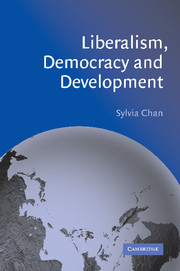Book contents
- Frontmatter
- Contents
- Acknowledgements
- List of abbreviations
- Introduction
- 1 The question: is ‘liberal democracy’ good for economic development?
- Part I The present context of democratisation and decomposing ‘liberal democracy’
- Part II The democracy–development debate: old problem, new thinking
- Bibliography
- Index
- References
Bibliography
Published online by Cambridge University Press: 22 September 2009
- Frontmatter
- Contents
- Acknowledgements
- List of abbreviations
- Introduction
- 1 The question: is ‘liberal democracy’ good for economic development?
- Part I The present context of democratisation and decomposing ‘liberal democracy’
- Part II The democracy–development debate: old problem, new thinking
- Bibliography
- Index
- References
Information
- Type
- Chapter
- Information
- Liberalism, Democracy and Development , pp. 237 - 270Publisher: Cambridge University PressPrint publication year: 2002
